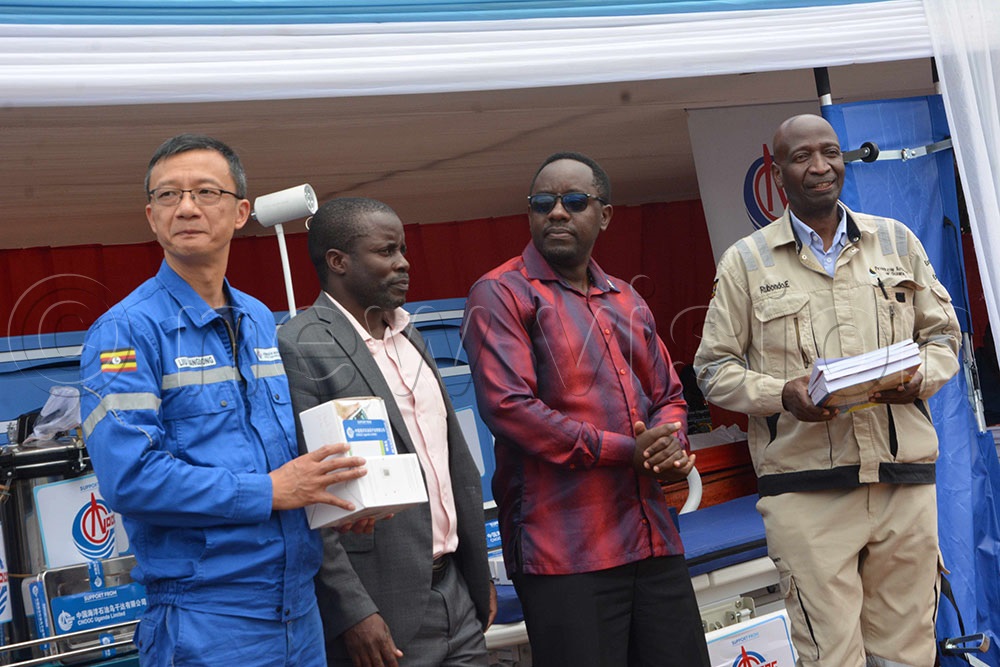Kyangwali Health Centre IV call for govt intervention after equipment donation
The facility serves over 41,331 people but has only 17 government-funded staff, a fraction of the required 120. Medical Teams International had supplemented this with 41 workers, but donor cuts have forced reductions, leaving staff overwhelmed.
Dr. Tibeita (R), the in-charge Kyanwali Health IV receives medical items from Earnest Rubondo, executive director PAU center, and Peter Banura, the Kikuube district Chairperson. (Credit: eter Abaanabasazi)
KIKUUBE - Kikuube district-based Kyangwali Health Centre IV (HCIV) faces a crisis of inadequate staffing, overcrowding, and lack of essential facilities. The state of the facility is, therefore, severely hampering healthcare delivery for over 41,000 residents and refugees.
Despite a recent donation of medical equipment, health workers warn that systemic challenges require urgent government intervention.
Kyangwali HCIV in charge Dr Shem Tibeita, describes dire conditions: “We lack adequate staff and space to handle the growing patient load from the community, Kyangwali Refugee Settlement, and neighbouring Kagadi district.”
The facility serves over 41,331 people but has only 17 government-funded staff, a fraction of the required 120. Medical Teams International had supplemented this with 41 workers, but donor cuts have forced reductions, leaving staff overwhelmed.
The shortage extends beyond staffing as Tibeita highlights crumbling infrastructure: “Our staff sleep in overcrowded quarters, three to a room, and many live off-site, causing delays and absenteeism. We lack a drug store, a mortuary, and functional equipment.”
One theatre bed, he noted, was so degraded that “doctors struggled to operate two patients simultaneously.”
CNOOC’s donation
The China National Offshore Oil Corporation (CNOOC) on Friday, August 22, 2025, came to the health centre's aid with a donation of 68 medical items, including beds, diagnostic tools, and resuscitators.
Tibeita praised the gesture: “These tools are lifesaving. The new theatre beds will replace faulty ones that left doctors struggling.”
CNOOC President Liu Xiangdon emphasised the focus on healthcare and education, “We aim to reduce maternal and child mortality and empower communities through better schools and clinics.”
Despite a recent donation of medical equipment, health workers warn that systemic challenges require urgent government intervention. (Credit: eter Abaanabasazi)
“Buhuka Health Centre III will receive 52 sets of medical equipment, while Kyangwali HCIV will receive 68 sets. These items were carefully selected based on our assessments and will strengthen the capacity of health workers while improving services for mothers, children, and families.
By supporting healthcare delivery, we also contribute to Uganda’s national goals of reducing maternal and child mortality, improving equitable access to healthcare, and easing the pressure on social services in this growing region,” Xiangdong said.
Xiangdong added, “Education is equally critical for the future. When children learn in well-equipped environments, they are empowered to reach their full potential. That is why we are also equipping 11 primary schools in our area of operation with 400 desks and 880 textbooks.”
Despite the donation, systemic issues persist. Kikuube District Chairperson Peter Banura acknowledged the strain of donor cuts.
“Because of cutting of health donor funding resulting from world politics, most of our partners left shop and some of the health centers were handed over to the Government. So, you can imagine the pressure that the district and the Government in general has, getting back all these health centres with their staff becomes a big challenge, so when you come in with some of these essential items both for health centres and schools, we see it as a big relief,” he said.
Petroleum Authority of Uganda’s Ernest Rubondo urged companies to prioritise community welfare, saying, “Oil wealth must benefit the people. CNOOC’s support sets a positive example.”
“Many of you have had of Countries where oil is, but there is a lot of dissatisfaction, that you cannot come to the community, produce oil, transports it and leave the community as it is, so the government of Uganda working together with CNOOC have prioritized the other services that are not producing oil and gas” Rubondo said.